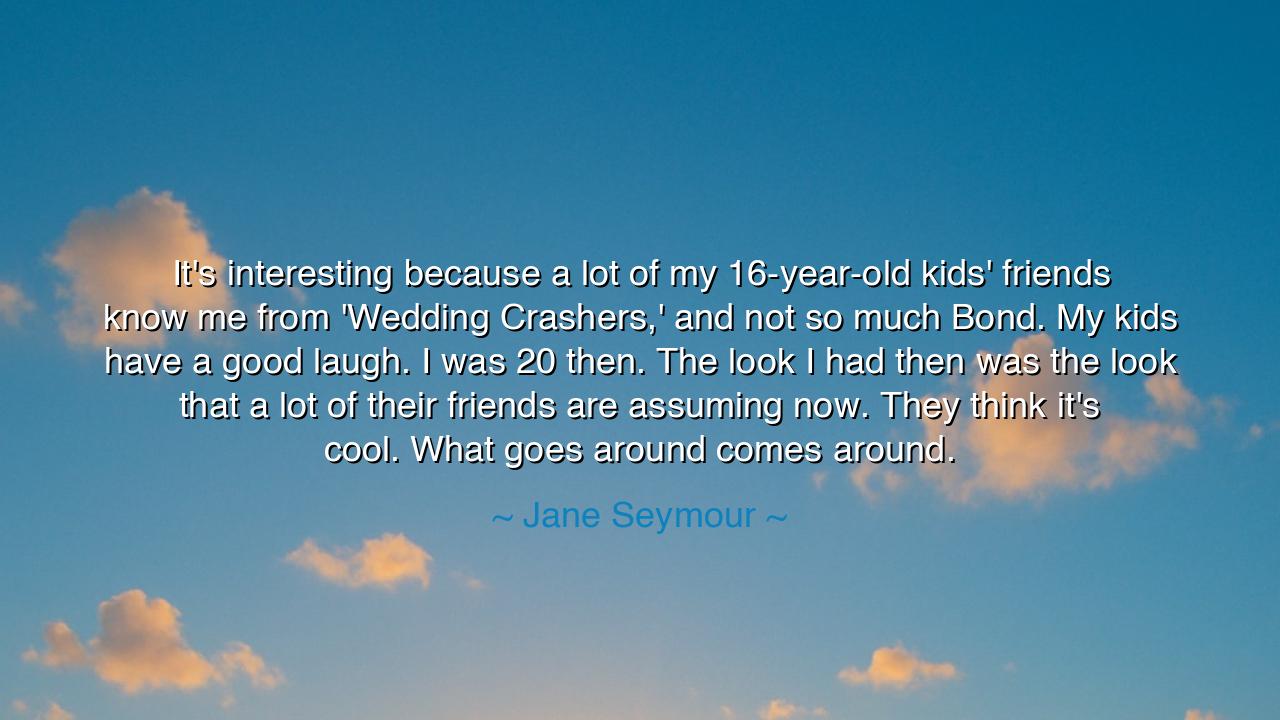
It's interesting because a lot of my 16-year-old kids' friends
It's interesting because a lot of my 16-year-old kids' friends know me from 'Wedding Crashers,' and not so much Bond. My kids have a good laugh. I was 20 then. The look I had then was the look that a lot of their friends are assuming now. They think it's cool. What goes around comes around.






In the words of Jane Seymour, “It's interesting because a lot of my 16-year-old kids' friends know me from Wedding Crashers, and not so much Bond. My kids have a good laugh. I was 20 then. The look I had then was the look that a lot of their friends are assuming now. They think it's cool. What goes around comes around.” we hear the eternal rhythm of time, the cycle by which fashions, roles, and memories return anew. Her reflection is not only about film and appearance, but about the way life repeats itself, surprising us with echoes of what once was.
The shift between Bond and Wedding Crashers shows how identity is perceived differently by each generation. What one age remembers as glory, another recalls as comedy; what once seemed youthful and new may later return as style reborn. Seymour’s observation, filled with humor, reveals how fleeting cultural memory is, and yet how the circle of time ensures that nothing is truly lost. That which falls away in one generation rises again in another, familiar yet transformed.
History offers us the wisdom of Heraclitus, who declared that time is like a river, always flowing, yet always returning to itself. In the same way, the look Seymour once bore at twenty has returned among the youth of her children’s world, proving that what seemed bound to its age was only waiting for renewal. What she embodied then, others now imitate, and thus the cycle of admiration and imitation continues without end.
Her words also speak to the humility of legacy. One may dream of being remembered for greatness, for Bond-like elegance or heroic roles, yet future generations often recall us through different lenses. It is not for us to dictate how we are remembered, but for time to weave our images into the tapestry of memory. Seymour, with grace, laughs with her children, recognizing that remembrance itself—however it arrives—is a gift.
So let this wisdom endure: do not cling to how the world sees you, for the vision of today will change tomorrow. Celebrate instead the cycles of time, which return old joys, fashions, and stories in new forms. As Seymour teaches, what goes around truly comes around, and the beauty of youth, though it seems lost, often returns in the faces and laughter of generations yet to come. Thus the circle of life ensures that nothing we give to the world is ever wholly gone—it waits only to rise again.






TTThao Thanhh
I really enjoy Jane Seymour’s perspective on how her kids' friends find her cool based on her 'Wedding Crashers' role rather than her Bond days. It’s funny how certain looks and moments from the past can be revived and appreciated by younger generations. Do you think the way society looks back on past trends says something about how we view nostalgia and cultural shifts?
DTDoan Thuc
Jane Seymour’s reflection on the way her appearance and roles have resonated with different generations is so interesting. It’s fascinating how the things we once thought were outdated or uncool are now seen as trendy by younger people. It’s like time keeps recycling fashion and cultural moments. Do you think this cyclical nature of trends applies to other aspects of life, like music or art?
TVLau thi Vu
I love how Jane Seymour embraces the fact that her kids’ friends see her in a different light now. The idea that trends and 'coolness' come full circle is a great observation. It’s funny to think that the same look that she wore in her twenties is now considered trendy by a new generation. Do you think cultural trends always come back around, or do they evolve into something entirely new?
BQLe bao quan
Jane Seymour’s comment about how her kids’ friends recognize her more from 'Wedding Crashers' than from her Bond roles is an interesting reflection on how our public image evolves over time. It’s funny how the ‘cool’ factor changes with each generation. Do you think the concept of ‘cool’ is cyclical, or is it more about the context and who’s popular at the moment?
CTChanz Thu
Jane Seymour's reflection on how her kids' friends know her more from 'Wedding Crashers' than from her Bond days is both humorous and insightful. It’s fascinating how pop culture shifts and how what was once 'cool' becomes iconic in a different generation. Do you think this kind of generational shift in trends and cultural references is inevitable, or does it reflect how rapidly culture evolves?